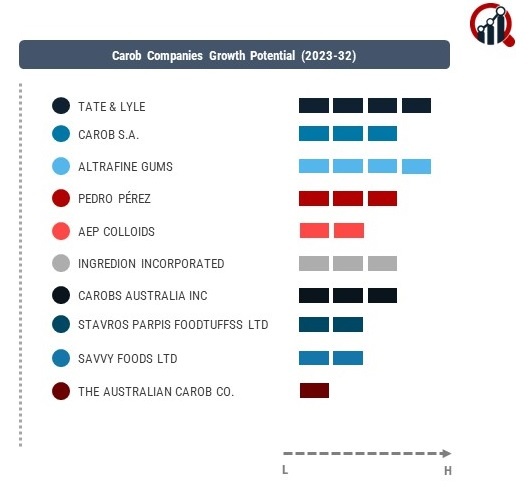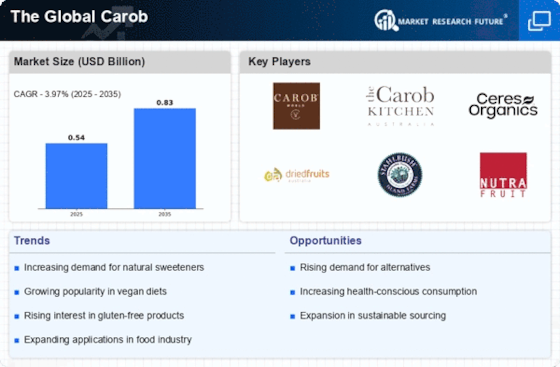Top Industry Leaders in the Carob Market

The Carob market is influenced by several key players shaping the industry. Prominent brands and companies in this sector include Australian Carobs pty ltd in Australia, Tate, and Lyke of United Kingdom, DuPont of United States, Starvos Papis Food ltd of Cyprus, Altrafine Gums of India, and Pedro Perez of Spain. These established entities have solidified their positions through expertise in carob cultivation, processing, and product innovation. Their strategies revolve around ensuring consistent quality, diversifying product lines with carob powder, syrup, and whole carob pods, and emphasizing sustainable sourcing and production methods to meet diverse consumer preferences.
Factors for Market Share Analysis:
Market share analysis within the Carob industry encompasses crucial factors. Brand reputation, product quality, purity, price competitiveness, certifications (such as organic or non-GMO), and global sourcing significantly impact market positioning. Brands offering high-quality carob products with transparent sourcing practices, ethical production, and versatile applications in food, confectionery, and health segments secure a competitive edge. Additionally, factors like consumer education, marketing campaigns highlighting health benefits, and adherence to regulatory standards influence market share.
New and Emerging Companies:
In tandem with established players, new and emerging companies are entering the Carob market, focusing on niche aspects such as specialized formulations, sustainable practices, and innovative product applications. These emerging players leverage innovative processing techniques, organic farming practices, and unique product offerings targeting specific consumer segments seeking premium, sustainably sourced carob products. Moreover, they often employ digital marketing strategies and collaborations to establish themselves as alternatives in the competitive market.
Industry News:
Industry news in the Carob market centers around technological advancements in processing, shifts in consumer preferences towards natural and healthy ingredients, and sustainability initiatives. Brands are investing in research and development to enhance extraction techniques, improve product purity, and meet evolving consumer demands for organic, non-GMO, and sustainably sourced carob products. Additionally, there's a notable emphasis on partnerships with farmers, initiatives promoting ethical sourcing, and certifications ensuring environmental and social responsibility throughout the supply chain.
Current Company Investment Trends:
Current investment trends within this market underscore a strong emphasis on sustainability, innovation, and consumer-centric strategies. Companies are investing in sustainable farming practices, supporting fair trade initiatives, and enhancing supply chain transparency to meet consumer demands for ethically sourced carob. Furthermore, investments in marketing campaigns promoting carob's health benefits, diversification of product lines, and expansion into new markets to increase global reach are prevalent among industry players.
Overall Competitive Scenario:
The overall competitive scenario within the Carob market remains dynamic and consumer-driven. Established players face competition from newer entrants focusing on unique formulations, sustainability, and catering to evolving consumer preferences for natural, healthy products. Differentiation through product quality, sustainability efforts, certifications, and alignment with changing consumer demands for natural, nutritious products will determine a company's success and competitive standing in this rapidly evolving market landscape.
Key Companies in the carob market include
- Australian Carobs pty ltd in Australia
- Tate and Lyke of United Kingdom,
- DuPont of United States
- Starvos Papis Food ltd of Cyprus
- Altrafine Gums of India
- Pedro Perez of Spain

- Beta
Beta feature
- Beta
Beta feature










